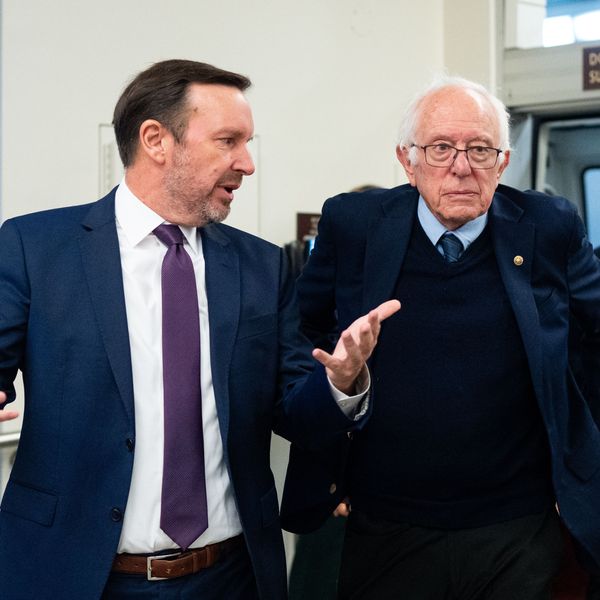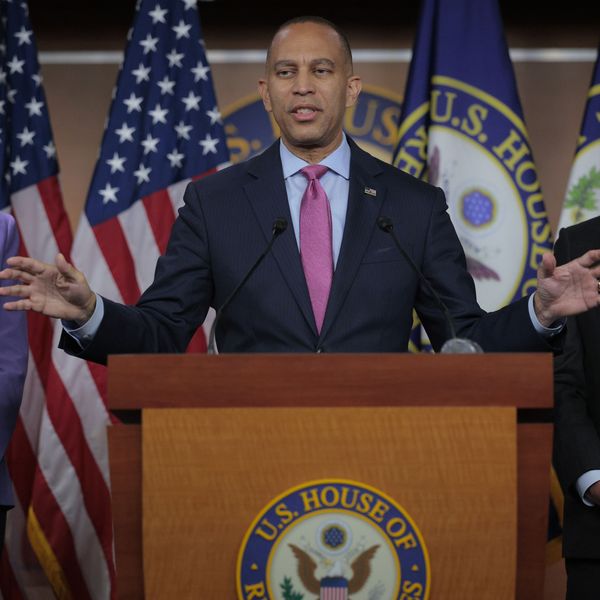Greece's economic and political future - and with it the fate of the eurozone - hung in the balance on Sunday after its political leaders announced that the formation of a government of national unity would have to wait until Monday morning at the earliest - well after global financial markets had opened.
Amid fears of the crisis worsening and the political situation in debt-laden Italy further imperilling the single currency, party heads in near-bankrupt Greece said while agreement had been reached on an interim coalition government, further talks were required on the new administration's life span and who would lead it.
A statement issued after crunch talks between embattled prime minister George Papandreou, opposition leader Antonis Samaras and head of state Karolos Papoulias confirmed that the socialist premier had agreed to resign midway through his four-year term in office and would not be at the helm of the government.
But with no firm details on who would take over, the markets are braced for more volatility, ahead of the eurozone finance ministers' meeting at which the politicians will begin a search for new sources of capital to boost the area's main bailout fund to EUR1tn after the US and emerging powers refused to commit fresh funds at the G20 summit last week.
The two-hour meeting at the presidential palace was the first real breakthrough in the political deadlock that has gripped Athens since Papandreou met Papoulias on Saturday, and announced that he would try to form a broad-based administration that would steer the country through its worst crisis in modern times.
The new government would pave the way to "immediate elections" once it had achieved its goal of securing last month's EUR130bn bailout package for Greece - an aid deal that has been greeted furiously by austerity-weary Greeks but is widely seen as the eurozone's main weapon against the debt-stricken nation defaulting and bringing down the rest of the union with it.
Senior politicians from the ruling Pasok party and conservative New Democracy continued talks late into the night. Papandreou and Samaras will reconvene on Monday.
"This uncertainty that is torturing the Greek people must end," said Papoulias ahead of the meeting. "We must find a solution. All of Europe wants us to find a solution."
The talks came after Papandreou held his last cabinet meeting as prime minister and Samaras stepped up pressure on his political opponent to stand aside.
Disagreement over who should succeed the 59-year-old scion of Greece's most famous political dynasty was cited as the main stumbling block despite the threat of a Greek exit from the EU if Athens failed, posthaste, to approve the controversial debt deal hammered out in Brussels in October.
Capturing the urgency of the situation, the mass-selling Sunday Kathimerini appealed for a new government to be sworn in by Monday to "avert bankruptcy and the return to the drachma".
"At this point we don't care about faces," it opined in a font-page editorial. "The circumstances, our partners and most of all the Greek people, demand that a government of national salvation be formed by tomorrow AM."
Officials in Brussels say the creation of a government that would represent Greece's entire political spectrum is essential if the EU-IMF backed bailout is to be implemented along with the painful austerity measures it will inevitably entail.
For the first time since joining the then European Economic Community in 1981, Greece was told last week that its membership of the bloc was at stake if it failed, within weeks, to ratify the rescue plan.
"We have called for a national unity government and remain persuaded that it is the convincing way of restoring confidence and meeting the commitments," said EU economic and monetary affairs commissioner Olli Rehn.
Since Greece was forced to go cap in hand to the EU and IMF for rescue funds 18 months ago, its warring political parties have come under enormous pressure to overcome their differences and agree on a common strategy to solve the debt crisis. Evangelos Venizelos, the Greek finance minister who also holds the post of deputy premier, has likened the country's predicament to a matter of life or death, "of remaining in the eurozone, as a member of the developed world, or going back to the 1960s."
Last week Venizelos admitted that Athens' finances were hanging by a thread with public coffers due to run out of cash by mid-December. Bankruptcy would have a massive impact across the eurozone.
International figures, including IMF managing director Christine Lagarde, have pressed upon Athens the need for political consensus before lenders part with more loans. "At the IMF's annual meeting in Washington, the first thing Lagarde emphasised in talks with Venizelos was the need for consensus," a top aide to the minister said. "She asked him bluntly, 'What Greece am I talking to, the one who endorses reforms, who accepts austerity or the one who doesn't?' She was very concerned by the stance of the political opposition, especially the [main opposition] conservative party which has repeatedly refused to endorse the [EU-IMF] fiscal adjustment programmes."
Greece received a EUR110bn bailout in May 2010 with the latest aid package writing off half of the country's EUR360bn debt load.
The hard-won accord had met widespread fury in Greece where many fear it will mean further austerity. Last week Samaras argued it would condemn the country, whose economy has contracted by nearly 16% since mid 2009, to "a decade of deeper recession".
Under fire from his own Pasok party, Papandreou began the quest for a "national salvation" government after narrowly winning a confidence vote on Friday. "I am not tied to my chair," he declared after formally launching the push.
But his refusal to articulate his intent clearly until Sunday night cast a shadow over negotiations. Samaras said Papandreou had to resign "to unblock" the deadlock.
"As long as Mr Papandreou doesn't resign he is blocking what is foreseen by the constitution. I am determined to help as long as he resigns and everything takes its course," the main opposition leader declared.
Four candidates are reportedly being considered for the post of prime minister including Petros Molyviatos, a former conservative foreign minister, and Loukas Papademou, the erstwhile vice-president of the European Central Bank. Officials said the new premier would be named when eurozone finance ministers meet in Brussels on Monday to discuss Greece's plight.
Papandreou has faced growing calls to step down at home and abroad since shocking markets and world leaders with an ill-timed decision, announced last Monday, to put the October bailout agreement to a popular vote.



